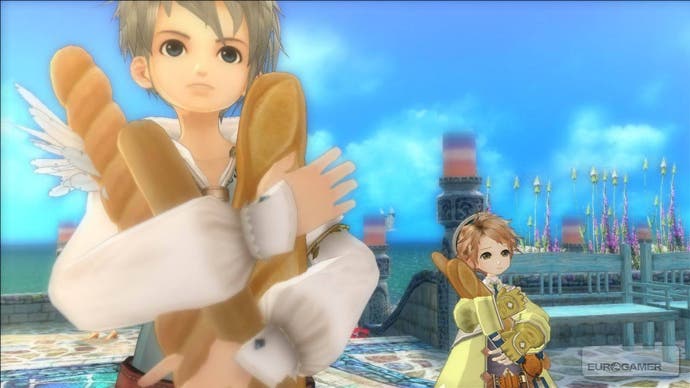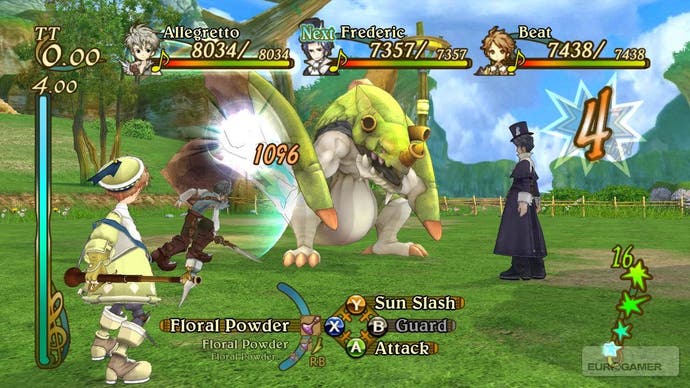Eternal Sonata
Hitting the right notes.
Videogames have always been a rich vein for ardent fans of the surreal. From the overtly psychedelic efforts of Jeff Minter's Tempest or Tetsuya Mizuguchi's Rez, through to the curiously domestic unreality of Keita Takahashi's Katamari Damacy, games provide some of the most unusual brain-fodder of any modern medium.
To our minds, though, things get downright weird when game designers start playing with historical figures - Japanese game designers, especially. Their willingness to perform eye-popping rewriting on their own history is legendary; witness the transformation of one of Japan's three key unifiers, Oda Nobunaga, into a fiery vengeful demon in the Onimusha series. It's no surprise, then, that European history comes out looking even more surreal when it's passed through the wringer.
Which roundabout introduction goes some way to explaining why I've just spent the best part of a week defeating an assortment of fantasy monsters with the aid of a spectacularly dandy-ish Frederic Chopin and his lethal conductors baton.
No, I'm Not Going Mad
Eternal Sonata - a game sadly renamed from its brilliantly odd Japanese title, Trusty Bell - is the latest RPG from Japanese studio tri-Crescendo, and the company's first Xbox 360 title. tri-Crescendo's major previous project was the great but largely ignored GameCube RPG Baten Kaitos, but the team's background is as the audio division of parent studio tri-Ace, working on titles like Star Ocean and Valkyrie Profile.

That history gives some clue as to why a Japanese developer would choose to make a game heavily based around the life and work of Polish classical pianist Frederic Chopin. tri-Crescendo's boss, Hiroya Hatsushiba, is an audio guy; he has worked for years as audio programmer for prolific composer (and fellow tri-Crescendo founder) Motoi Sakuraba.
In other words, Eternal Sonata is one of those rare but wonderful games whose design is led by the musicians. Here, though, the musical influence is even more obvious than in the likes of Silent Hill, whose development has been driven for years by composer Akira Yamaoka.
The premise of Eternal Sonata is exceptionally odd. It suggests that as Frederic Chopin lay dying in Paris in 1849, in his final comatose hours he entered a fantasy world in his dreams - which is plausible, we suppose, although we'd be rather surprised if a 19th century Polish composer's dreams featured colourful, large-eyed anime characters and turn-based battles. Still, you never know.
Despite a premise which seems, at first glance, downright pretentious, Eternal Sonata actually builds a solid narrative around a strong ensemble cast of characters. In fact, Chopin himself is one of your regular party members, but arguably not really a lead character. His initial certainty - and later doubt - that the world is really just the product of his own dream is an important plotline, but his actual character (youthful and handsome, albeit bearing a strange likeness to existing paintings of Chopin, and resplendent in a top hat and dandy-ish coat and tails) sits in the shadow of the rest of the cast.

That cast is notable for being named entirely after musical terms. Arguably the "lead" character (although this is one of those unusual RPGs where the cast truly is an ensemble, which is one of the very few parallels that could be drawn with the likes of Final Fantasy XII) is Allegretto, a young man who steals bread from stores in his home city to give to orphan children living in the town's sewers. He and his relentlessly likeable younger brother, Beat, encounter Chopin travelling with a terminally ill flower girl, Polka, and embark on a journey to find the root of the injustice in the land of Forte.
Along the journey, the cast swells significantly as a wide variety of new characters are encountered - from the bow-wielding shepherdess Viola to the charismatic rebel leader Jazz. Not all of these characters have particularly deep back-stories, and some seem to be introduced more for the variety they bring to the combat system (of which more in a moment) than anything else. However, the largely well-written dialogue mostly manages to avoid descending into philosophical babble - a trap we were wary of from the outset - and crucially, we genuinely liked the characters we were sharing the journey with.
Tied to the Present
Even Polka, the shrinking violent who occupies the stereotypically quiet and demure female role beloved of Japanese storytelling, manages not to be annoying - not least because her story is a perfect example of Eternal Sonata's clever combination of Chopin's life story and modern narrative.

Polka is dying of a fatal disease; but as a result, she has magical powers, and can heal wounds simply by laying on her hands. In the world of Eternal Sonata, these things are intricately linked - a reference, certainly, to Chopin's own fatal disease, which affected much of his later life. Equally, though, Polka finds herself feared and rejected by people who falsely believe the disease to be contagious - a plot thread which bears far more relevance to the modern phenomenon of HIV than to anything in the 19th century.
The fierce intelligence of the storytelling, even couched within the confines of a fairly generic role-playing fantasy world, doesn't end with a single example. Revolution, too, is a major theme; ostensibly exploring the 1830 uprising in Poland which affected much of Chopin's view of the world, but also delivering an interesting allegory for more modern events in Iraq and elsewhere.
This is a level of depth which we simply didn't expect from the game, and it's compounded further by the more direct allusions to Chopin's life and work throughout the narrative. Each chapter of the game is named after a famous piece of music created by the composer, and the influence of that score can be felt throughout Sakuraba's music in that chapter. At some point in the chapter, the piano music itself plays unaccompanied - while photographs of buildings and locations from Chopin's life appear on screen, and the background and history of the piece is explained.


